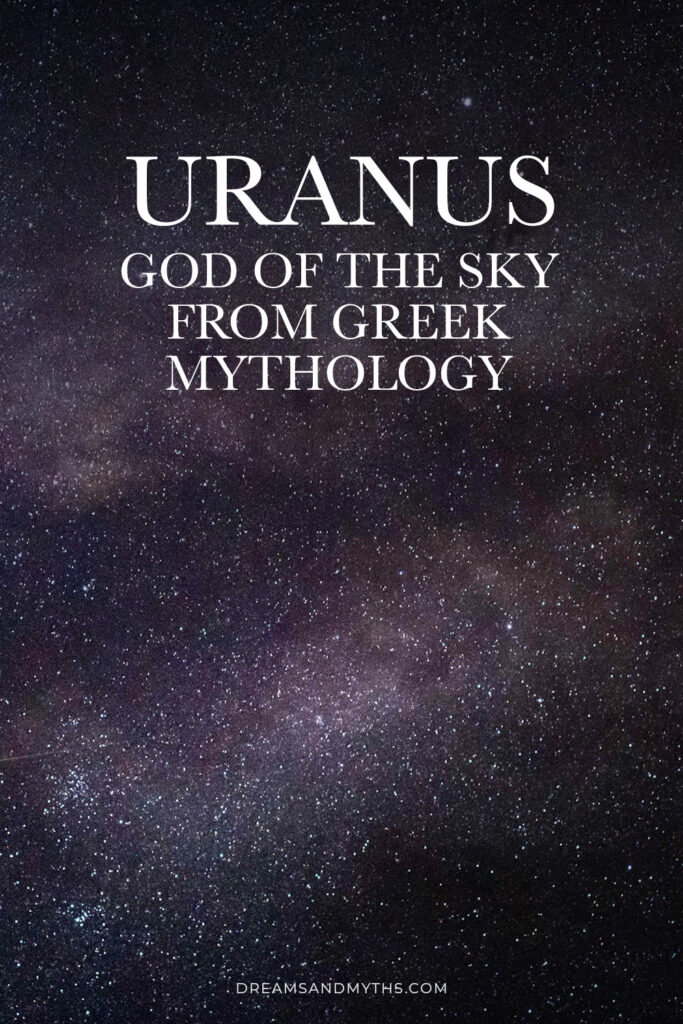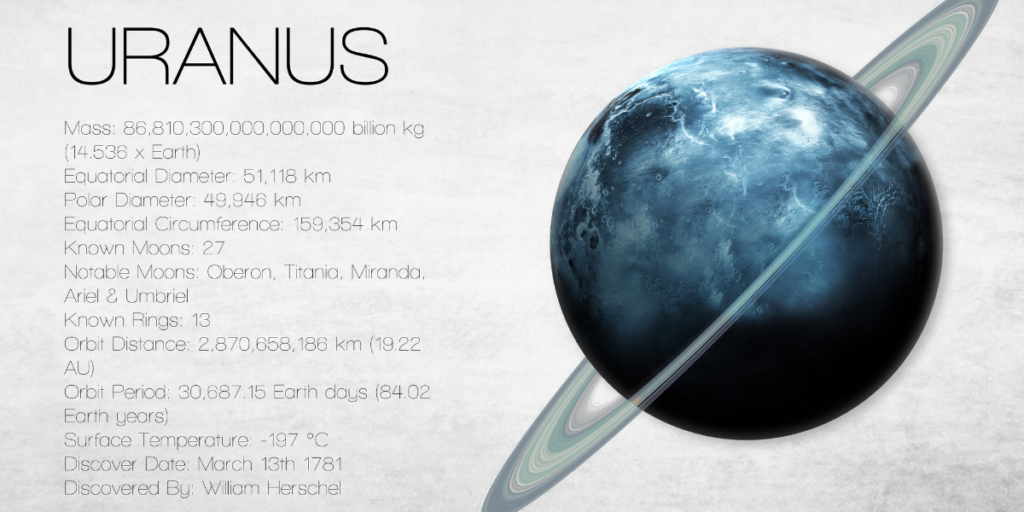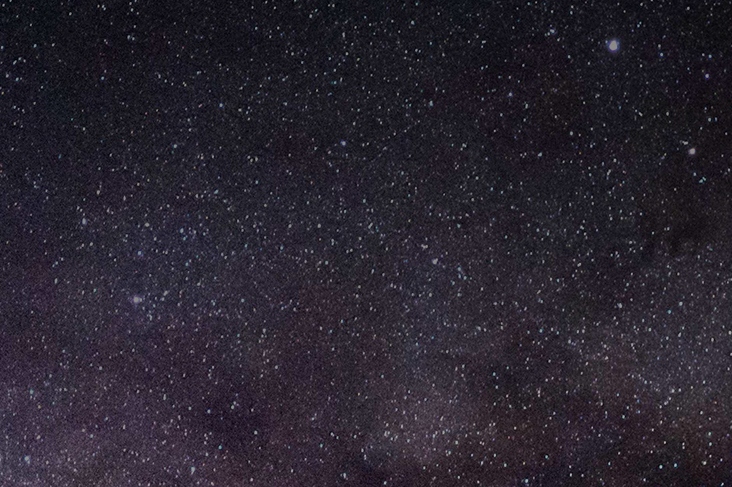Uranus or Ouranos is the literal personification of the sky and a primordial Greek deity. He also represents or is associated with the Roman god Caelus. To the ancient Greek people, the sky represented by Uranus appeared as a gigantic, immeasurable dome made of brass and bejeweled with thousands of stars.

In the Greek language, Uranus means the sky or heaven. However, the Proto-Indo-European origin of the name points to the term rain. Therefore, it denotes that Uranus means someone who produces rains or the rainmaker. Another Proto-Indo-European root of Uranus points to the term “height” or “top.” This translates Uranus to someone who occupies the highest seat. But this is a less accurate representation.
Uranus also did not have any anthropomorphic interpretations and is hardly represented in ancient Greek art pieces. But it is believed that he had a well-built, broad-shouldered, typically muscled, sturdy male body. In one of his representations, he is seen to be mounted on a zodiac.
Birth, Origin, and Role of Uranus
Uranus was the Son of Gaea(The personification of the Earth) and also her husband. He was the father of the 12 titans, namely Oceanus, Coeus, Crius, Hyperion, Iapetus, Theia, Rhea, Themis, Mnemosyne, Phoebe, Tethys, and Cronus.
He also fathered the three Cyclopes, Brontes, Steropes, and Arges, and the three Hecatoncheires (Cottus, Briareos, and Gyges).
Furthermore, it is said that when Uranus was castrated by Cronus, the blood of Uranus splattered onto the Earth, and from it was born the Erinyes(furies), the female deities of vengeance in Greek mythology, the giants, and the Meliae (The nymphs of the Ash trees).
It is also said that when Cronus threw the genitals of Uranus in the sea, they formed a white foam from which arose the Greek Goddess Aphrodite.
Uranus is simply considered to be the personification of the sky, a cover, and dome which is always present above the Earth and is held in its place by Atlas, the titan.
Mythological Stories Involving Uranus

Gaia, the goddess of the Earth, first bore the starry heaven Uranus, who was her equal, and who was supposed to cover her from every side and was meant to be an ever-abiding place for the Gods themselves to live in.
Uranus then fathered eighteen children with Gaia, which included the Titans, the cyclops, and the Hecatoncheires.
Uranus though hated all his children, and as soon as they were born, he would hide them in some corner of the Earth, which is literally Gaia, as she was the personification of Earth.
She had to undergo immense pain and suffering due to his behavior and was distressed and anguished by it. Hence in her anger and suffering, she produced a sickle made out of Adamant (considered to be a form or a variant of a diamond) and encouraged her children to teach their father a lesson.
None of her children came forward except for her youngest Son Cronus, who took the sickle from her and hid. With the Adamantine sickle, he ambushed Uranus and castrated him, and threw his genitals into the sea. The castration resulted in the birth of the Titans, and once it was done, it resulted in Cronus taking command of the entire Cosmos.
(The sickle which was used for castration is considered to be one that had been made by flint in the bronze age or even before the bronze age or the neolithic age of ancient Greece)
After the castration, it is said that Uranus became calmer, where he reconciled with Gaia and advised their daughter Rhea, the wife of Cronus, to go to the island of Crete to give birth to Zeus, who would overthrow Cronus and become the new ruler of the Gods.
After Cronus took control, he continued to imprison the titans and the Hecatoncheires in Tartarus out of fear, and Uranus and Gaia predicted that the cycle of the Son usurped the power of the father would continue.
After the castration, the sky no longer covered the Earth at night and was not always present around her. The original structure and woven fabric of the universe and the world came to an end. Uranus was no longer the being he once was. Now he was simply the sky. Uranus is considered to be one of the least anthropomorphic depictions of a God, as he was simply a name for the sky and nothing more.
He was simply a cover for the world or the Earth from external forces and elements or considered to be the roof of the world. He was held in place by the Titan Atlas, who would also tilt it periodically, which would cause the cycle of day and night. Uranus or Ouranos was also considered to be the natural sky.
And although Olympus was considered to be the abode of the Gods, Ouranos is also sometimes considered to be where the Olympian Gods live life collectively, as Ouranos is the sky or the heaven, the god’s abode is the heaven above the stars themselves.
Hecatoncheires
Uranus and Gaia were the parents to the massive and beastly Hecatoncheires, who were Cottus, The furious, Briareos, the vigorous, and the one with great limbs, Gyges. They were beings who were said to have 100 arms and were said to hold monstrous strength and power.
After their birth, Uranus was so horrified that he sent them to the depths of Tartarus along with the Titans to be imprisoned there for all eternity.
When Cronus became the supreme ruler of all things and his Son Zeus rebelled against him, he released the Titans but kept the Hecatoncheires confined as he was fearful of their immense power.
On the advice of Gaia, Zeus decided to free the Hecatoncheires, who joined the Gods of Olympus in their battle against the titans. They were one of the main forces who tilted the battle in favor of the Olympian Gods during the period of the Titanomachy.
Uranus, the Planet from the Solar System

The sixth planet was discovered in 1781, and a name was to be chosen for the planet. The English named it after their monarch, while the French did the same. The former planets which had been discovered were Mercury, Venus, Mars, Jupiter, and Saturn.
Finally, in the mid 19th century, the name Uranus was agreed upon due to the previous nomenclature of the planets, with Mercury, Venus, and Mars being the children of Jupiter, Jupiter(Zeus in Greek mythology), being the Son of Saturn, and Saturn(Cronus in Greek mythology), being the Son of Uranus.
While the other planets take up Roman names, Uranus is the only planet that still utilizes its Greek origin and nomenclature.
Now the question arises, why is Uranus, the planet named after a Greek god, whereas the rest of the planets derive their name from the Roman deities? The reason is that Uranus was discovered much later after the discovery of planets such as Venus, Mars, Jupiter, etc.
These were known by all for a long period of time. Their names are Roman, as the Romans were aware of the existence of these planets in the solar system except for Uranus.
Uranus could be spotted easily with your naked eye, but the ancient Romans could not notice it because it appeared quite dim in the sky. It is believed that the Greek astronomer Hipparchos of Nikaia first acknowledged the presence of a dimly-lit Uranus in the sky.
It orbited the Sun too slowly for Hipparchos to misunderstand that Uranus was not moving at all. It appeared stationary to him, so he thought Uranus was actually a star. Therefore, according to Hipparchos’s astronomy account, Uranus was recorded as a distant star.
Sir William Herschel, from the United Kingdom, was the first astronomer to identify Uranus as a planet in 1783. He wanted to name the newly discovered planet after King George III or the Latinized version called Georgium Sidus, the monarch ruling at that time.
He coined the name to honor the king and called it George’s star because he strongly believed that Uranus was found in modern times and deserved to be named in a different way, unlike the ancient planets named after prehistoric gods.
Some suggested that the new planet should be called Neptune, after the Roman god of the seas. But German astronomer Johann Elert Bode came up with the name Uranus for the planet and emphasized that the naming pattern should follow ancient Greek or Roman mythology.
He also said that the distance of the individual planets from the Sun should also be taken into consideration for naming them. In classical mythology, Saturn was the father of Jupiter, and Uranus was the father of Saturn, so it was finally decided that the new planet would be named Uranus.
Significance of the Greek God, Uranus
Although Uranus is one of the primordial deities, he loses his virility after his castration and does not play any major role in Greek mythology post the incident. He no longer envelops Gaia during the nights and moves above the ground and looks down from the heavens to see how the world functions. He does not intervene in any of the affairs of either the gods or the mortals.
It signifies the fact that Uranus simply personifies the vastness and emptiness of space and nothing more.
